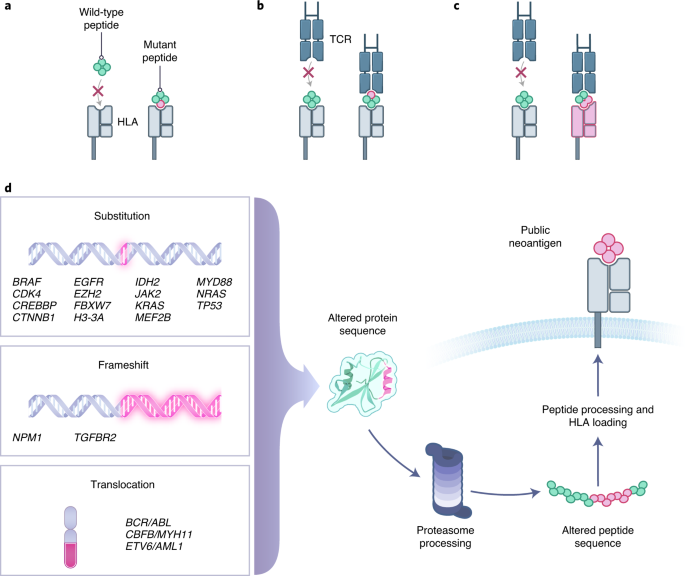Several kinds of HSP-based cancer vaccines which have been explored worldwide include tumor derived HSP-peptide complex cancer vaccines artificially reconstituted HSP-peptide complex cancer vaccines HSP-peptide fusion protein cancer vaccines and HSP-based DNA cancer vaccines etc. Heat shock protein-based cancer vaccines.

Targeting Public Neoantigens For Cancer Immunotherapy Nature Cancer
It was shown that heat shock proteins HSPs play a crucial role in the development of immune response against tumours.
Protein based cancer vaccines. 1 a selected tumor antigen. However delivery of these peptides and proteins as components within caged protein nanoparticles has shown promising improvements in vaccine efficacy. Vaccine but as a treatment for bladder cancer.
Replacement of the spike protein transmembrane and C-terminus regions with those of HA. 2 a cell-penetrating peptide to improve antigen delivery and epitope presentation and 3 a TLR24 agonist to serve as a self. Hematol Oncol Clin North Am.
This article attempts to explain why cancer vaccines have failed so far delineate the increasingly complex barriers that prevent the eliciting of effective antitumor immunity and examines the ability of heat shock protein-based vaccines to overcome these barriers. HSP-based vaccines have been studied in early phase clinical trials mostly using HSP glycoprotein 96 for various types of malignancies including melanoma renal cell carcinoma gastric cancer pancreatic cancer low-grade lymphoma colorectal cancer and chronic myelogenous leukemia. Thus HSPs represent multifunctional agents not only with chaperone functions.
Many HSP-based cancer vaccines are being tested in clinical trials. They are used through different delivery systems. 01112016 HSPs are seen as important anticancer vaccine adjuvants.
This broad and general principle is the basis for a new generation of vaccines against cancers and infectious diseases and circumvents the need for identification of the T-cell epitopes for any given cancer or infectious agent. 08072021 After the mRNA vaccine is injected into the patient the mRNA tells the patients cells to produce proteins that are associated with the specific mutations on. 17062021 The Covid-19 vaccines approved for use in the UK work by giving the body instructions on how to make the spike protein so that if the person is later infected their immune system can generate a response that attacks the virus via the spike protein faster and more effectively.
The most advanced for Covid-19. 01012019 Peptide and protein-based cancer vaccines usually fail to elicit efficient immune responses against tumors. All showed minimal toxicity and potential efficacy.
13052021 M1 VLPs were used in a SARS-CoV vaccine consisting of M1 envelope protein and chimeric spike protein 19. Current advances in cancer treatment are based on the recent discoveries of molecular mechanisms of tumour maintenance. Novel immunopreventive strategies are emerging that show great promise for conferring long-term protection to individuals at high risk of developing colorectal cancer.
Protein-based vaccines include toxoids inactivated bacterial toxin and subunit or subvirion products. Protein-based nanoparticles in cancer vaccine. Dr Bridles concern rests on two claims.
Heat shock protein-based cancer vaccines. Initially peptide-based cancer vaccines often consisted of exact MHC-I-binding short peptides. However delivery of these peptides and proteins as components within caged protein nanoparticles has shown promising improvements in vaccine efficacy.
Inactivated vaccines can be composed of either whole viruses or bacteria or fractions of either. CHP-NY-ESO-1 is a novel therapeutic cancer vaccine consisting of a recombinant protein of cancer antigen NY-ESO-1 and a polysaccharide-based delivery system cholesteryl pullulan. Novavax has the furthest-developed protein-based vaccine in phase 2 clinical trials.
Peptide and protein-based cancer vaccines usually fail to elicit efficient immune responses against tumors. The KISIMA vaccine platform utilizes a chimeric protein comprising. Yet protein-based vaccines are well established and will likely work.
Heat shock protein-based cancer vaccines and related thoughts on immunogenicity of human tumors. Advantages of protein nanoparticles over. 1Department of Microbiology and Immunology University of Miami Miller School of Medicine FL USA.
20052021 Researchers in the UK have developed a protein-based subunit vaccine directed against severe acute respiratory syndrome coronavirus 2 SARS-CoV-2 that could serve as an alternative to the. Fractional vaccines are either protein-based or polysaccharide-based. HSPsantibodies peptideprotein-HSP complexes tumor antigenHSP gene fusion viral peptidesHSP complexes or gene fusion viral proteinsbacterial HSP fusion.
Lee KP1 Raez LE Podack ER.

To Kick Of Heartmonth Check Out This Infographic About Heartdisease Prevention And Risk Factors Heart Disease Risk Factors Heart Disease Facts Heart Health

Gene Therapy With Adenovirus Gene Therapy Therapy Gene

Personalized Cancer Vaccines Clinical Landscape Challenges And Opportunities Molecular Therapy
Mrna Therapies And Mrna Vaccines In Cancer







0 comments:
Post a Comment